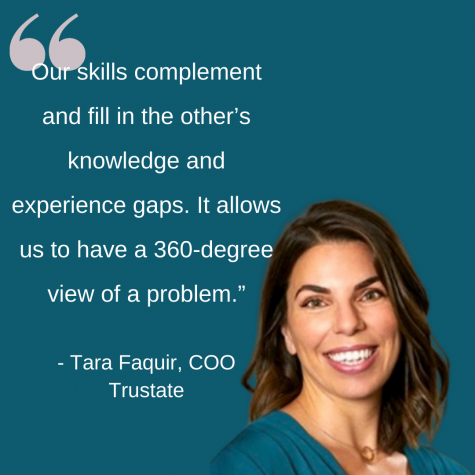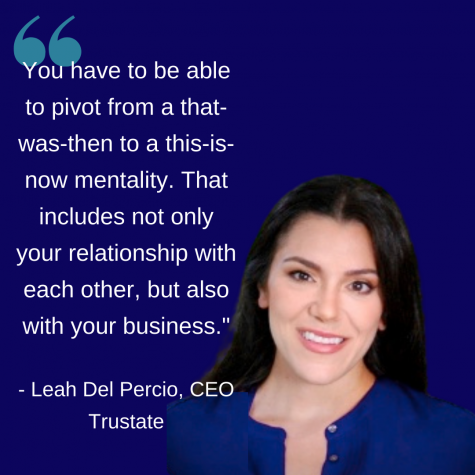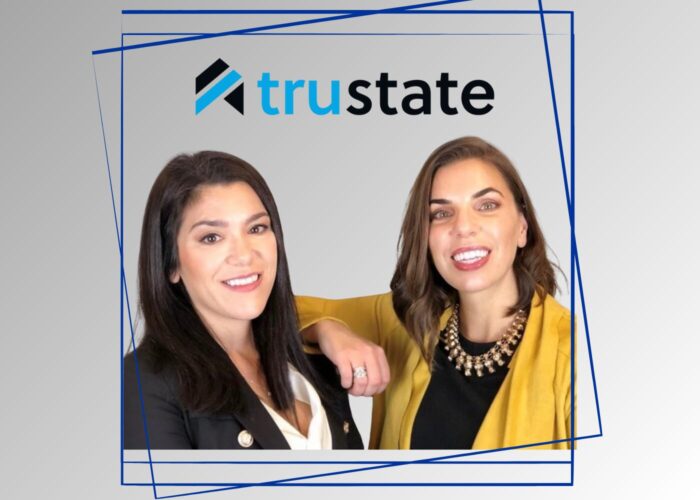Featuring Trustate’s Leah Del Percio + Tara Faquir
Having multiple founders helming a startup can bring diverse skill sets, experience, and networks to the table. Especially for businesses in the growth stage, the co-founder model lends an added gravitas that venture capital investors look for in a management team.
Many of the companies in the GingerBreadCap portfolio fit this profile. More than half of the startups we’ve invested in have two (or more) co-founders occupying the C-suite. Co-founder-led companies aren’t a sure-fire recipe for success, of course. A co-founder relationship is often compared to a marriage (and we all know how that can work out). But when the chemistry is right, the co-founder model can provide a distinct advantage over going at it alone.
Trustate: a Co-Founder Case Study
Trustate is a prime example of the two-heads-are-better approach. Co-founders Leah Del Percio and Tara Faquir launched their startup in 2020 to help Trusts & Estates professionals and the clients they serve more easily and effectively administer the closing of the estates of loved ones who have passed on. GingerBread Capital was an investor in Trustate’s $1.8M seed round, which closed last December.
Both founders knew first-hand how difficult the closing of a deceased person’s estate can be. Leah, Trustate’s CEO, spent more than a decade as a Trusts & Estates attorney with major firms including Goldman Sachs, JP Morgan, and DLA Piper. During her lawyering years she settled hundreds of estates of high-net-worth individuals and saw how the process drained both families and legal professionals of time, money and peace of mind. Tara, Trustate’s COO, also had first-hand experience assisting in the closing of estates of her beloved grandparents while juggling demanding full-time executive and sales roles with major retailers Nordstrom and Rent the Runway.
& Estates attorney with major firms including Goldman Sachs, JP Morgan, and DLA Piper. During her lawyering years she settled hundreds of estates of high-net-worth individuals and saw how the process drained both families and legal professionals of time, money and peace of mind. Tara, Trustate’s COO, also had first-hand experience assisting in the closing of estates of her beloved grandparents while juggling demanding full-time executive and sales roles with major retailers Nordstrom and Rent the Runway.
Having been besties since meeting during their undergraduate years at the University of Miami more than 15 years ago, Leah and Tara’s long-standing friendship is the bedrock of their business partnership. But they also know that it takes more than friendship to make a partnership work.
Below, Leah and Tara share six key ingredients that make their co-founder relationship a success.
1. Passion, values and vision.
While they hail from different backgrounds, both founders share a deep desire to “lessen the pain points” for grieving families and the trusted professionals they turn to, and make the closing of an estate a less frustrating, less costly, and less time-consuming process for all stakeholders. That desire arose from both founders’ own personal and professional experiences and frustrations with the process.
 “Closing an estate should not take years and create more financial hardships for families,” says Leah. “We started Trustate to provide an end-to-end service for both executors and Trusts & Estates professionals to be more effective and efficient.”
“Closing an estate should not take years and create more financial hardships for families,” says Leah. “We started Trustate to provide an end-to-end service for both executors and Trusts & Estates professionals to be more effective and efficient.”
2. Complementary skill sets and strengths.
Leah holds several law degrees and spent a decade as a practicing attorney for major corporations and high net worth individuals. Tara, who holds an MBA from Temple University, hails from an entrepreneurial family and started her first business post-college selling a line of women’s workout gear.
“Our skills complement and fill in the other’s knowledge and experience gaps,” says Tara. “It allows us to have a 360-degree view of a problem.”
Leah adds: “I’m more data driven, and spend more time analyzing a situation. For Tara, making quick decisions is in her blood. We really balance each other well.”
3. An unwavering trust in one another.
Trust in your co-founder is imperative, they emphasize. “Trust allows us to be open and honest about what we think about, and how we view what we’re trying to accomplish with our business,” Leah observes.
Trust also means believing in what you’re building together, Tara notes. “You’re the ones building the business, and you know it better than anyone else. So accept unsolicited advice in stride but be confident in yourself and each other.”
4. Being able to disagree, respectfully.
With a foundation of trust, you can have difficult conversations with each other, and be able to disagree while still being committed to finding the best solutions to whatever problems arise.
“It also means being vulnerable, and admitting you’re not perfect and don’t know everything,” Tara adds.
5. Listening, actively.
“We’re both pretty direct and blunt people, and we’ll tell you what’s on our minds,” Leah notes. “That extends to every person on our team, too. Our job as leaders is to inspire our team to find meaning in their work, optimize their skills and let them know that we’ve got their back.”
“We’re big believers and practitioners of open and often communication,” says Tara. “And not just with each other. I do lots of regular sales meetings and customer interviews to listen to people’s needs and concerns and to understand how we can better serve our market.”
6. Agility to pivot and adjust quickly to new circumstances.
“You have to recognize that relationships evolve over time,” says Tara. “We still have time for fun and laughter as friends. But now as business partners, what’s fun for us is talking about work, and how excited we are to be building this business together!”
Adds Leah: “You have to be able to pivot from a that-was-then to a this-is-now mentality. That includes not only your relationship with each other, but also with your business. Being able to respond to market forces and the changing needs of your customers is key to growth.”
Thinking about establishing a co-founder relationship? Read this Forbes article about the 12 essential points you need to cover in a partnership agreement.
This post was originally published on April 22, 2022.
